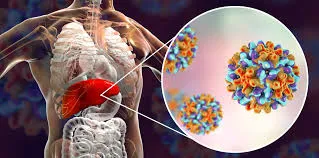Hepatitis B: Causes, Risk Factors, Symptoms, Prevention, Complications, Lifestyle And Home Remedies
Hepatitis B is a serious liver infection caused by the hepatitis B virus (HBV). For some people, hepatitis B infection becomes chronic, meaning it lasts more
than six months. Having chronic hepatitis B increases your risk of developing liver failure, liver cancer or cirrhosis — a condition that causes permanent scarring of the liver.Most
people infected with hepatitis B as adults recover fully, even if their signs
and symptoms are severe. Infants and children are more likely to develop a
chronic hepatitis B infection. A vaccine can prevent hepatitis B, but there's
no cure if you have it. If you're infected, taking certain precautions can help
prevent spreading HBV to others.
WHAT YOU WILL LEARN:
Symptoms
Causes
Risk factors
prevention
Complications
Lifestyle and home remedies
Coping and support
SYMPTOMS
Signs and symptoms of hepatitis B, ranging from mild to severe, usually appear about one to four months after you've been infected. Signs and symptoms of hepatitis B may include:
- Abdominal pain
- Dark urine
- Fever
- Joint pain
- Loss of appetite
- Nausea and vomiting
- Weakness and fatigue
- Yellowing of your skin and the whites of your eyes
(jaundice)
CAUSES
Hepatitis
B infection is caused by the hepatitis B virus (HBV). The virus is passed from
person to person through blood, semen or other body fluids.
Common ways HBV is transmitted include:
Sexual contact. You may become infected if you
have unprotected sex with an infected partner whose blood, saliva, semen or
vaginal secretions enter your body.
Sharing of needles. HBV is easily transmitted through
needles and syringes contaminated with infected blood. Sharing intravenous (IV)
drug paraphernalia puts you at high risk of hepatitis B.
Accidental needle sticks. Hepatitis B is a concern for
health care workers and anyone else who comes in contact with human blood.
Mother to child. Pregnant women infected with HBV
can pass the virus to their babies during childbirth. However, the newborn can
be vaccinated to avoid getting infected in almost all cases. Talk to your
doctor about being tested for hepatitis B if you are pregnant or want to become
pregnant.
Acute vs. chronic hepatitis B
Hepatitis
B infection may be either short-lived (acute) or long lasting (chronic).
Acute
hepatitis B infection lasts less than six months. Your immune system likely can
clear acute hepatitis B from your body, and you should recover completely
within a few months. Most people who acquire hepatitis B as adults have an
acute infection, but it can lead to chronic infection.
Chronic
hepatitis B infection lasts six months or longer. When your immune system can't
fight off the acute infection, hepatitis B infection may last a lifetime,
possibly leading to serious illnesses such as cirrhosis and liver cancer.
The
younger you are when you get hepatitis B — particularly newborns or children
younger than 5 — the higher your risk the infection becoming chronic. Chronic
infection may go undetected for decades until a person becomes seriously ill
from liver disease.
RISK FACTORS
Hepatitis B spreads through contact with blood, semen or other body fluids from an infected person. Your risk of hepatitis B infection increases if you:
- Have unprotected sex with multiple sex partners
or with someone who's infected with HBV
- Share needles during intravenous (IV) drug use
- Are a man who has sex with other men
- Live with someone who has a chronic HBV infection
- Are an infant born to an infected mother
- Have a job that exposes you to human blood
- Travel to regions with high infection rates of
HBV, such as Africa, Central and Southeast Asia, and Eastern Europe
COMPLICATIONS
Having a
chronic HBV infection can lead to serious complications, such as:
Scarring of the liver (cirrhosis). The inflammation associated with a
hepatitis B infection can lead to extensive liver scarring (cirrhosis), which
may impair the liver's ability to function.
Liver cancer. People with chronic hepatitis B
infection have an increased risk of liver cancer.
Liver failure. Acute liver failure is a
condition in which the vital functions of the liver shut down. When that
occurs, a liver transplant is necessary to sustain life.
Other conditions. People with chronic hepatitis B
may have kidney disease, inflammation of blood vessels or anemia.
LIFESTYLE AND HOME REMEDIES
The
hepatitis B vaccine is typically given as three or four injections over six
months. You can't get hepatitis B from the vaccine.
The hepatitis B vaccine is recommended for:
- Newborns
- Children and adolescents not vaccinated at birth
- Anyone who has a sexually transmitted infection,
including HIV
- Developmentally disabled people who live in an
institutional setting and staff
- Health care workers, emergency workers and other
people who come into contact with blood
- Men who have sex with men
- People who have multiple sexual partners
- People with chronic liver disease
- People who inject illicit drugs
- People who live with someone who has hepatitis B
- People with end-stage kidney disease
- Sexual partners of someone who has hepatitis B
- Travelers planning to go to an area of the world
with a high hepatitis B infection rate
- Take precautions to avoid HBV
Other ways to reduce your risk of
HBV include:
Know the
HBV status of any sexual partner. Don't engage in unprotected sex unless you're
absolutely certain your partner isn't infected with HBV or any other sexually
transmitted infection.
Use a new
latex or polyurethane condom every time you have sex if you don't know the
health status of your partner. Remember that although condoms can reduce your
risk of contracting HBV, they don't eliminate the risk.
Stop using
illicit drugs. If you use illicit drugs, get help to stop. If you can't stop,
use a sterile needle each time you inject illicit drugs. Never share needles.
Be
cautious about body piercing and tattooing. If you get a piercing or tattoo,
look for a reputable shop. Ask about how the equipment is cleaned. Make sure
the employees use sterile needles. If you can't get answers, look for another
shop.
Ask about
the hepatitis B vaccine before you travel. If you're traveling to a region
where hepatitis B is common, ask your doctor about the hepatitis B vaccine in
advance. It's usually given in a series of three injections over a six-month
period.
COPING AND SUPPORT
If you've
been diagnosed with hepatitis B infection, the following suggestions might help
you cope:
Learn about hepatitis B. The Centers for Disease Control
and Prevention is a good place to start.
Stay connected to friends and
family. You can't
spread hepatitis B through casual contact, so don't cut yourself off from
people who can offer support.
Take care of yourself. Eat a healthy diet full of fruits
and vegetables, exercise regularly, and get enough sleep.
Take care of your liver. Don't drink alcohol. Don't take
prescription or over-the-counter drugs without consulting your doctor. Get
tested for hepatitis A and C. Get vaccinated for hepatitis A if you haven't
been exposed.












